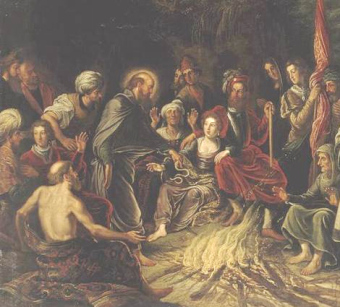Saved on Malta
The soldiers, who were answerable with their lives for the detention of their prisoners, were afraid lest some of them should swim out and escape to Malta. They therefore, in the spirit of true Roman cruelty, proposed to kill them at once (Acts 27:42 - 43). Now again the influence of Apostle Paul over the centurion's mind was made the means of saving both his own life and that of his fellow-prisoners.
Paul prevented the Roman soldiers from accomplishing their heartless intention near Malta and directed those who could swim to cast themselves into the sea first, while the rest made use of spars and broken pieces of the wreck. Thus it came to pass that all escaped safely through the breakers to the shore.
A Venomous Encounter
Paul was blessed to work many miracles during his stay in Malta. The first one that took place on the island, however, was for his benefit and protection!
After coming ashore Paul sought to gather wood to build a fire. After placing the wood onto his growing fire a venomous snake, made angry by the sudden flames, came out of the heat and wrapped itself around the apostle's arm (Acts 28:3). The island's superstitous pagan residents, upon seeing the serpent, were convinced that Paul would be bitten and die as fate's punishment for some heinous sin he committed.

Paul, however, simply shook the snake off his arm and into the fire (Acts 28:5)! He was neither bitten nor suffered any harm whatsover, a miracle of protection Jesus promised to those who preach the gospel (see Mark 16:18). The island natives, when they saw the apostle unharmed by the serpent, quickly changed their mind about Paul and thought he was a god (Acts 28:6)!
Publius, the Roman governor of Malta, soon discovered that Paul and company had survived being shipwrecked. Upon this discovery He graciously provided lodging for the apostle and others (Acts 28:7).
Healings
Paul, while staying with Publius, is made aware that his father was suffering from dysentery in an aggravated form. The apostle went in to where the man was staying, prayed, laid hands on him, and he miraculously recovered. This tremendous miracle, as would be expected, was quickly noised throughout Malta. Soon, countless others on the island came to the apostle and were healed of their infirmities.
It is interesting to note that among all those sick on Malta that the services of Luke the physican, who was with Paul, were never requested or needed! All those who were made well were done so through miracles.
Those on Malta were not wanting in gratitude to those whose unexpected visit had brought so much good among them. They loaded Paul and company with every honor in their power, and, when they put to sea again, supplied them with everything that was needful for their wants (Acts 28:10).
Paul, after a three month stay on Malta that saw countless miracles performed, sailed for Italy in a ship called the Castor and Pollux. Castor and Pollux, in mythology, were twin brothers who were worshipped as gods. They were the pagan gods called upon to help sailors who were shipwrecked and to bring favorable winds to those who worshipped them.